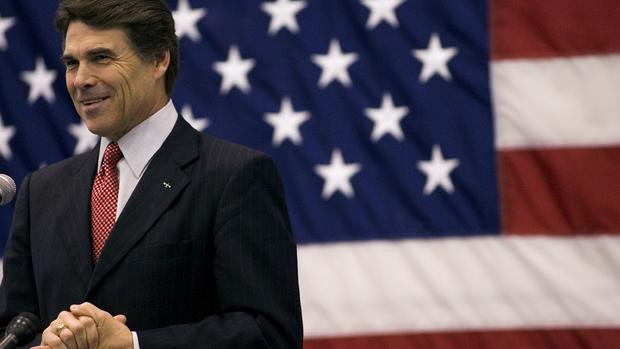Can a flat tax plan save Rick Perry?
Texas governor and Republican presidential candidate Rick Perry revealed plans yesterday to unveil a proposal to replace the complicated federal income tax with a flat taxwhen he lays out his economic plan next Tuesday. (See video below.)
We don't know the details of the plan yet, but generally, a flat tax means everyone would pay the same marginal income tax rate. Perry's embrace of the idea seems designed to both give him a talking point against Herman Cain's 9-9-9 plan and set up a clear contrast between Perry and another rival, Mitt Romney.
Let's begin with Cain. In criticizing 9-9-9 at the GOP presidential debate Tuesday, Perry memorably told Cainhe was gearing up to "bump plans with you, brother." The beauty of a flat tax proposal is it takes one of the chief selling points of Cain's plan - its simplicity - and takes it a step further.
The idea also has a long conservative pedigree:It was memorably championed by an earlier GOP presidential candidate, Steve Forbes, and has been floating around conservative think tanks for decades. That means Perry will have ready-made responses to his critics that could keep him from struggling to defend his plan, as Cain did on Tuesday. And while Perry could be accused of copying Cain's idea of strongly advocating a far simpler tax code, his timing seems just about perfect in light of the onslaught of negative headlines about 9-9-9.
And then there's Romney. Despite polls showing Cain leading the GOP pack, most political insiders see the race as one between Perry and Romney, in large part because of their establishment connections and massive fundraising advantage over their rivals. Romney's plan is a collection of 59 proposals to spur economic growth; he defended its complexity to Cain during a debate last Tuesday after Cain challenged him to name all 59 points. "Simple answers are often very helpful, but sometimes inadequate," Romney shot back.
Yet complexity can be a tough sell in a presidential campaign, and the difference between Perry's forthcoming plan and Romney's current one could ultimately define the two men. Perry's best shot at the nomination may well be in convincing Republican voters that he is a straight-shooter seeking clear-cut solutions, and the flat tax plan provides a significant opportunity to set up a contrast with Romney, a Harvard and Stanford-educated northeasterner willing to deride "simple answers" and seemingly unwilling to junk a tax system many Americans think is outmoded and overly-complex. It's also a chance for Perry to go after Romney on his perceived strength: His credentials when it comes to steering the economy.
This isn't to say the flat tax doesn't come with risks. Perry has yet to explain exactly how his proposal, which could potentially include an exemption up to a certain income level, would work. But assuming it resembles Forbes' plan (which had a 17% rate), Perry will be vulnerable to charges that he wants to raise taxes on poor and middle-class families, who would lose at least some of the advantages of a progressive tax system, while cutting taxes for the rich. That's possibly problematic in a GOP primary - just ask Cain, who's had to fight off attacks on that front over 9-9-9 - and potentially devastating if Perry gets to the general election, as it plays directly into Democratic arguments that Republicans favor the rich over the middle class.
But the Perry campaign, seeking to reverse the Texas governor's slide in the polls, clearly believes the advantages of a flat tax plan outweigh the potential drawbacks. And if they're right, the long-simmering proposal might well get the Texas governor back to the forefront of the fight for the Republican presidential nomination.

